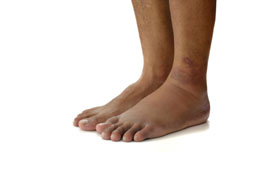Ankle edema or swollen ankles and feet are caused by a range of factors including diseases such as gout, arthritis, certain medication, and pregnancy. Here is a look at common causes of ankle edema and the treatment options.

Ankle edema is the medical term for ankle, feet, and leg swelling. This painless swelling of the ankles is particularly noticeable in older people. The primary cause of the swelling is the fluid retention in the cells. Although edema is commonly observed in the peripheral regions of the body, it can affect other body parts as well. There are a range of causes for swollen ankles in people, which range from dietary habits, injuries, or even old age.
Causes
Medical Conditions: There are a number of diseases that trigger swelling in the ankles. Most of these conditions result in blood and fluid retention and clogging, thus causing the feet to swell up. Injuries causing blood clots and leg infections are some common medical conditions that cause ankle edema. Other diseases that cause swollen feet and ankle are varicose veins, venous insufficiency, lymphatic obstruction, surgery of the foot, burns, and insect bites or stings. Arthritis affecting the joints of the body and gout attacks can cause painful ankle edema. Hypertension is also believed to be one of the factors causing the swelling in the foot and the ankles.
Dietary Causes: A diet which contains excess of sodium-containing products is one of the primary reasons for ankle swelling. An average adult needs around 2400 mg of sodium at the most. This is then regulated by the kidney. In the absence of effective regulation and excretion of the sodium by the kidney, there is a buildup in the tissues. This excess sodium deposited in body parts then allows fluid retention and swelling of the feet.
Medication: Certain birth control pills contain the hormones estrogen and testosterone which causes fluid retention in ankles leading to edema. In addition to this, calcium blockers, such as nifedipine, amlodipine, diltiazem, felodipine, and verapamil, prescribed for lowering blood pressure, steroids, and antidepressants, such as phenelzine and tranylcypromine, may trigger off the swelling.
Pregnancy: Ankle edema during pregnancy is quite a common feature. This is because of water retention in body during the stages of pregnancy and the pressure on your pelvic veins and your vena cava during the later stages of pregnancy. The excessive pressure slows down the return of blood from your legs, causing it to pull. This forces fluid from your veins into the tissues of your feet and ankles.
Other Causes: There are many other causes that result in ankle edema. Obesity, long periods of standing, long airplane flights, menstrual periods, and age are some of the major causes of swollen ankles.
Symptoms
Persistent ankle swelling throughout the day or one that worsens as the day progresses is often accompanied by other symptoms as well. Long term edema causes pitting or an indention in the swollen area and ulcerations in the affected area. Other symptoms of include headaches, palpitations, increased urination, swollen hands, puffy eyes, and a gradual increase in weight.
Diagnosis and Treatment
For the diagnosis, the doctor may conduct a complete physical examination with other diagnostic tests such as ECG, chest x-ray, urinalysis, and blood tests. The treatment is based on the diagnosis of the edema. However, to reduce the puffiness, the doctor may prescribe certain diuretics. In addition to this, you can try some home remedies for reducing the swelling. These include:
- Regular leg exercises help reduce the swelling by improving the blood circulation and release of the fluids from the tissues.
- Avoid standing or sitting for long periods of time.
- Limiting the amount of sodium in the diet can help reduce the puffiness and swelling.
- Elevating the leg for short periods of time allows the blood to flow effectively. You can also use a footrest when you need to sit for long hours.
- Support stockings, available at most medical stores, can ease the swelling in the ankles.
If the swelling is a persistent feature or if it is accompanied by red, warm feet and fever, then it is best to consult a doctor. While ankle edema in pregnancy is commonly observed, if there is excessive swelling and pain, then have it checked right away.
Disclaimer: This article is for informative purposes only, and should not be treated as a substitute for professional medical advice.


 Ankle edema is the medical term for ankle, feet, and leg swelling. This painless swelling of the ankles is particularly noticeable in older people. The primary cause of the swelling is the fluid retention in the cells. Although edema is commonly observed in the peripheral regions of the body, it can affect other body parts as well. There are a range of causes for swollen ankles in people, which range from dietary habits, injuries, or even old age.
Ankle edema is the medical term for ankle, feet, and leg swelling. This painless swelling of the ankles is particularly noticeable in older people. The primary cause of the swelling is the fluid retention in the cells. Although edema is commonly observed in the peripheral regions of the body, it can affect other body parts as well. There are a range of causes for swollen ankles in people, which range from dietary habits, injuries, or even old age.